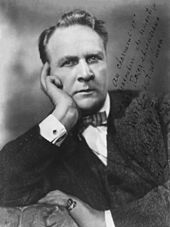Fyodor Ivanovich Chalyapin
Fyodor Chaliapin ( Russian Фёдор Иванович Шаляпин , scientific. Transliteration Fedor Ivanovich Šalâpin * Feb. 1 . Jul / 13. February 1873 greg. In Kazan , Russian Empire ; † 12. April 1938 in Paris ) was a Russian opera singer in the vocal range Bass .
Live and act
The son of a poor farmer had no regular training and initially only little musical practice. He made his first attempts at singing in the church choir. In 1894 he made his debut in Tbilisi as high priest in Giuseppe Verdi's Aida , then moved to the Mariinsky Theater in Saint Petersburg . In 1896 he joined a private Moscow opera stage, where he appeared as Boris Godunov and Ivan the Terrible .
In 1901 Chalyapin went to Western Europe. First he sang at La Scala in Milan and from 1907 at the New York Metropolitan Opera . However, he was not very much appreciated there and therefore moved to the Paris Opera in 1908 . A gig in New York in 1921 was a great success. This time he stayed in town and sang there for six seasons. In 1926 he was engaged by the London Royal Opera House Covent Garden .
Chaliapin has not appeared in the Soviet Union since 1921 because he disagreed with its policies. However, he stressed that he was not anti-Soviet. Nevertheless, his honorary title of folk artist was revoked in 1927.
In addition to his Russian repertoire, he distinguished himself as Méphistophélès in Gounod's Faust , Don Basilio , Leporello and King Philip . Chaliapin was a gigantic figure and sang a dark colored powerful bass. He was one of the first singers to value a deeper psychological understanding of their characters in operatic acting. What is most impressive about his singing is the dramatic intensity of his presentation, which was only achieved later by Maria Callas and a few others.
In 1910 he took on the leading role in the world premiere of Don Quixote by Jules Massenet in Monte Carlo . In 1932/33 he also made a film with this title under the director Georg Wilhelm Pabst ; Don Quixote was filmed in German, French and English, always with Chaliapin in the lead role - a common practice at the time, as films could not be dubbed until the late 1930s . The German version of the film is considered lost.
Chaliapin had been married to the Italian ballerina Iola Tornaghi since 1898 and had six children. His youngest son Fyodor Fyodorowitsch Chalyapin made a career as an actor.
Fyodor Ivanovich Chalyapin was first buried in Paris; In 1984 his remains were transferred to Moscow's Novodevichy Cemetery .
Aftermath
Chaliapin is considered the most famous bass player of the first half of the 20th century. A Chaliapin Opera Singing Festival has been held in Crimea every year since 2000 .
Maxim Gorky , who was friends with Chaliapin, wrote about him with unusual enthusiasm: “This person is a genius to say the least. There is something monstrous that subdues the crowd with terrifying, diabolical violence ... Even if he sang nothing but 'Lord, have mercy!' ... He knows how to sing these words in such a way that the Lord, if he exists, will immediately hear them and immediately have mercy on everyone or turn the earth into dust and ashes. "
On November 13, 1993, Chaliapin was honored with an official silver commemorative coin from the still young Russian Federation .
Naming
Chaliapin is the namesake of the Chaliapin steak, or steak Chaliapin. It was invented in Japan in 1936 when Chaliapin had problems with his teeth while touring there.
Fonts
- Fyodor Ivanovich Chaliapin: Pages from My Life . Harper and Brothers, 1927
- Fyodor Ivanovich Chaliapin: Man and Mask: Forty Years in the Life of a Singer . Alfred A. Knopf, 1933
- Fyodor Ivanovich Chaliapin: An Autobiography as Told to Maxim Gorky . Macdonald, 1968
literature
- Eduard A. Stark: Shaliapin . Golike and Vil'borg, 1915
- Mark Osipovich Iankovskii: Shaliapin . Iskusstvo, 1972
- Elena Andreevna Grosheva: Fedor Ivanovich Shaliapin . 2 volumes, Iskusstvo, 1976–79
- Viktor Borovsky: Chaliapin. A Critical Biography . Alfred A. Knopf, 1988
- Iurii Fedorovich Kotliarov, Viktor Ivanovich Garmash: Letopis' Zhizni i Tvorchestva FI Shaliapina . Muzyka, 1989
- Anatolij Vasil'evič Lunačarskij : Šaljapin in "Don Quixote" ; Translated from Russian by Hans-Joachim Schlegel . In: Wolfgang Jacobsen (Ed.): GW Pabst . Argon, Berlin 1997. ISBN 3-87024-364-3
Web links
- Literature by and about Fyodor Iwanowitsch Schaljapin in the catalog of the German National Library
- Fyodor Chalyapin sings: Вниз по матушке по Волге youtube.com
- Article Fyodor Ivanovich Chalyapin in the Great Soviet Encyclopedia (BSE) , 3rd edition 1969–1978 (Russian)
- Christoph Vratz: February 13th, 1873 - Birthday of Fedor Iwanowitsch Schaljapin WDR ZeitZeichen on February 13th, 2013. (Podcast)
Individual evidence
- ^ David Ewen: Musicians Since 1900: Performers in Concert and Opera . HW Wilson Company ,, ISBN 978-0-8242-0565-2 .
- ↑ Gottfried Cervenka : The demon of the opera stage: triumvirate Callas-Caruso-Schaljapin . ORF , April 29, 2008
- ↑ https://de.deborahnormansoprano.com/eda-i-napitki/34257-steyk-shalyapina-istoriya-sozdaniya-blyuda-recepty-steyka-po-shalyapinski.html
| personal data | |
|---|---|
| SURNAME | Chaliapin, Fyodor Ivanovich |
| ALTERNATIVE NAMES | Šaljapin, Fëdor Ivanovič; Шаляпин, Фёдор Иванович (Russian) |
| BRIEF DESCRIPTION | Russian opera singer (bass) |
| DATE OF BIRTH | February 13, 1873 |
| PLACE OF BIRTH | near Kazan |
| DATE OF DEATH | April 12, 1938 |
| Place of death | Paris |


